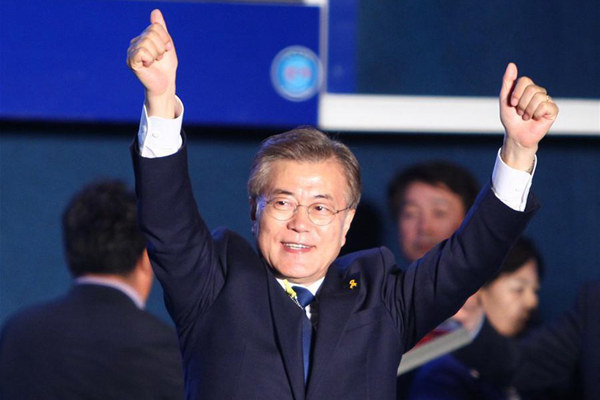Will new moon lead to warmer sunshine over Korea?
- By Earl Bousquet
 0 Comment(s)
0 Comment(s) Print
Print E-mail China.org.cn, May 12, 2017
E-mail China.org.cn, May 12, 2017
|
|
|
Moon Jae-in of the liberal Minjoo Party waves during a celebration event in Seoul, South Korea, on May 9, 2017. [Photo/Xinhua] |
On his last day at the White House while handing the keys over to his successor, outgoing President Barack Obama warned incoming President Donald Trump that the Oval Office has a tendency of having "a calming effect" on new tenants, especially when it comes to transforming campaign promises into public policy. He also warned the new president that "North Korea" should be his Number One foreign policy priority, above all else.
At the end of his First 100 Days in Office, the new president had learned a-hundred-times-over that his two-term predecessor was right – and on both counts.
But there are two things Obama could not have prepared Trump for: the rapid escalation of the military stand-off in the Korean Peninsula while the former Republic of Korea (ROK) President Park Geun-hye was facing trial for corruption; and the result of the election that followed her impeachment.
With the May 9 election now having presented a new political paradigm shift in Seoul, Washington's doublespeak policy towards the Democratic People's Republic of Korea (DPRK) can soon experience another gear-shift, as new ROK President Moon Jai-in is less likely to automatically back the U.S.'s high-impact, aggressive and militarized proxy approach to dealing with an always defiant Pyongyang regime.
The new ROK president has a totally different approach than Washington, opting instead for a return to the peaceful "Sunshine Policy" approach. He noted during the campaign that the two Koreas were united for 5,000 years and the six decades of division is a relatively brief historical moment. He's also already said that he will visit Pyongyang, once the conditions are made right.
That's not the kind of tune the war hawks in Washington want to hear from Seoul, where the U.S.'s offensive THAAD Missile System was surreptitiously deployed and operationalized almost overnight, at a time when the ROK was without an elected leader.
The new Moon administration might also have some differences with Washington over the THHAD deployment, which has not only drawn stiff opposition from inside the ROK, but also raised public concern that Seoul may have to foot the billion-dollar bill.
Regime change has come in Seoul amid continuing events of concern to China and the rest of the world.
Just ahead of the ROK election, the U.S. (on May 3) tested its long-distance Minuteman 3 intercontinental ballistic missile from an air force base in California to an atoll in the Pacific, covering enough distance to reach the DPRK.
Following deployment of the THAAD system in South Korea, Beijing a week later (on May 10) confirmed the People's Liberation Army (PLA) Rocket Force had also conducted a missile test, to enhance its capability to fend-off threats to China's national security.
After earlier threatening to (again) bomb the DPRK into oblivion, President Trump and Secretary of State Rex Tillerson are now (again) both talking about possible U.S. support for a peaceful path to peace with Pyongyang, each (again) also waving mixed flags and sending confusing signals.
International observers fear that the U.S. president's recent improved domestic popularity ratings following his decision to launch Tomahawk missiles against Syria may encourage the U.S. Commander in Chief to again try to augment his poll ratings with another similar show of strength, this time against the DPRK.
Under elevated domestic pressure and criticism following his May 9 dismissal of CIA Chief James Coby in the middle of the agency's investigations into alleged links between his campaign officials and Russia, Trump is also widely expected by the mainstream U.S. press to resort to his usual creation of a new distraction.
North and South Korea will be the first to suffer from any first strikes, but China faces all the possible risks. However, its unambiguous Korean peninsula policy has been patient and consistent all along: repeatedly calling on all sides to replace war threats with peace talks, warning the U.S. against deployment of the highly intrusive THAAD system and independently imposing unilateral sanctions against both the DPRK and the ROK.
The leadership change in Seoul opens the hopeful possibility of the unpredictable Pyongyang regime again being invited to resume the long-halted six-party talks to discuss a two-track, peace-based solution that will lead to a denuclearization of the Korean peninsula, silencing of the war drums and new engagement with Seoul about serious tension de-escalation.
Nobody ever knows what tomorrow will bring. But hope is very much alive that a new moon is rising that will lead to a new sunrise for the Korean people on both sides of the imposed "38th Parallel" that has divided them since the end of the costly war still much remembered on both sides.
Earl Bousquet is a contributor to china.org.cn, editor-at-large of The Diplomatic Courier and author of an online regional newspaper column entitled Chronicles of a Chronic Caribbean Chronicler.
For more information please visit: http://www.china.org.cn/opinion/earlbousquet.htm
Opinion articles reflect the views of their authors, not necessarily those of China.org.cn.







Go to Forum >>0 Comment(s)